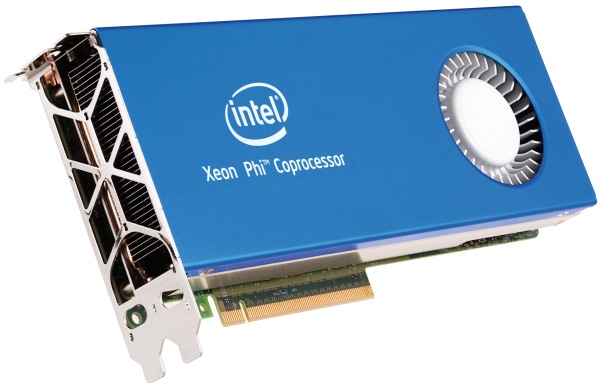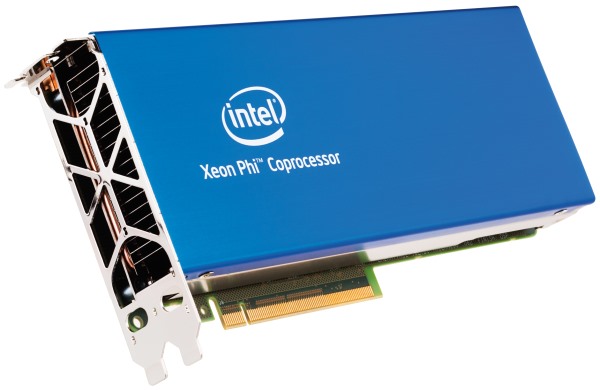Intel Preparing Xeon Phi Series Co-Processors
Some new information has surfaced regarding Intel's upcoming Xeon Phi Co-processors.
Intel's product database has been updated, and it now shows five new Xeon Phi co-processors. These five are followups of the original Xeon 5110P, SE10P, and SE10X models. Two lighter Xeon Phi 3100 parts have shown up: a mid-end part, the 5120D, and two premium 7100 series parts.
For those who don't know what a co-processor is, in the case of these Xeon Phi co-processors, it is simply an x86 based processor slammed onto a PCIe 8x expansion card. The purpose of them is to increase processing power for desktops and servers, specifically for tasks that have to be executed by a processor, not a graphics card.
The Xeon Phi co-processors are quite different from the standard CPUs we know. They feature more than 50 processing cores and have 8 GB of GDDR5 memory aboard the PCB. Just like the Ivy Bridge parts, they are baked on a 22 nm lithography. Due to the onboard memory in combination with an x86 processor, the device can even work as a fully independent computer, with tasks coming in through the PCIe interface, and only sent out and returned once completed.
| Model | Cores | CPU Clock | L2-cache | GDDR5 Speed | Memory | Interface | GFlops | TDP |
|---|---|---|---|---|---|---|---|---|
| SE10P/X | 61 | 1.10 GHz | 30.5 MB | 5.5 GHz | 8 GB | 512 bit | 1073 GFlops | 300W |
| 5110P | 60 | 1.05 GHz | 30 MB | 5.0 GHz | 8 GB | 512 bit | 1011 GFlops | 225W |
| 5120D | 60 | 1.05 GHz | 30 MB | 5.5 GHz | 8 GB | 512 bit | 1011 GFlops | 245W |
| 7120P/X | 61 | 1.25 GHz | 30.5 MB | 5.5 GHz | 8 GB | 512 bit | 1220 GFlops | 300W |
| 3120A/P | 57 | 1.10 GHz | 28.5 MB | 5.0 GHz | 6 GB | 384 bit | 1003 GFlops | 300W |
* Table courtesy of Hardware.info.
The main differences between the current Xeon Phi co-processors and the previous ones are the Xeon CPUs that are aboard, as well as the cooling blocks. Any model with the extension "*P" in the name has the passively cooled cooler, while others have the active drum cooler. The "*D" will not ship with a cooler.
A rumor indicates that the new Xeon Phi co-processors might even still hit the market this month, but it remains unverified.
Get Tom's Hardware's best news and in-depth reviews, straight to your inbox.
Niels Broekhuijsen is a Contributing Writer for Tom's Hardware US. He reviews cases, water cooling and pc builds.
-
marshal11 Seems like pretty cool stuff. Reminds me of the old Slot 1 Pentium IIs. I still have my old Pentium II 266MHz laying around somewhere as an Antique :)Reply -
danwat1234 An official seti@home credit increaser board?Reply
Wow it's amazing that this is real. You obviously need software to communicate with this SOC board.
Why use so many low clocked cores when you could use fewer higher clocked cores and save silicon? -
teknic111 What practical application will this serve in a desktop that a video card cannot do?Reply -
juanml82 They are useful for scientific calculations/simulations, video/3d rendering and that kind of stuffReply -
Kamab "What practice application will this serve in a desktop that a video card cannot do?"Reply
GPUs have much smaller "instruction sets" if you will, and cannot trace out solutions through iteration, or have large amounts of core specific local memory (state variables, flags, etc). With GPUs you tend to know the operation they will do start-to-finish ahead of time (aka there is no conditional branching).
Granted, there are ways/interfaces to do CPU workloads with GPUs, albeit less efficiently (work per watt probably an important consideration with these cards). -
flamethrower205 It doesn't serve a purpose for your average desktop, it's meant for scientific computing. There ones finds numerous parallelizable applications that can be sped up by many factors with these kinds of cards.Reply
I'm curious to see what kind of price/ performance ratios we get out of the new stock. Pretty schweet stuff overall! -
flamethrower205 It doesn't serve a purpose for your average desktop, it's meant for scientific computing. There ones finds numerous parallelizable applications that can be sped up by many factors with these kinds of cards.Reply
I'm curious to see what kind of price/ performance ratios we get out of the new stock. Pretty schweet stuff overall! -
memadmax Reply10846272 said:What practice application will this serve in a desktop that a video card cannot do?
Any of the SETI@Home projects should be able to use this nicely.


